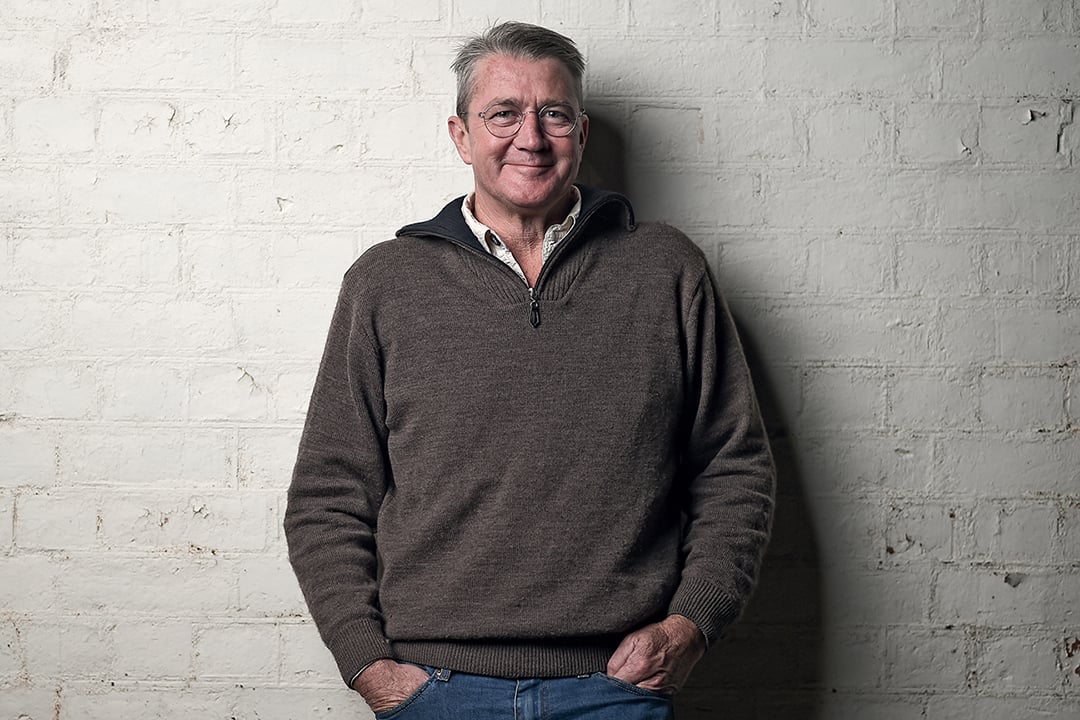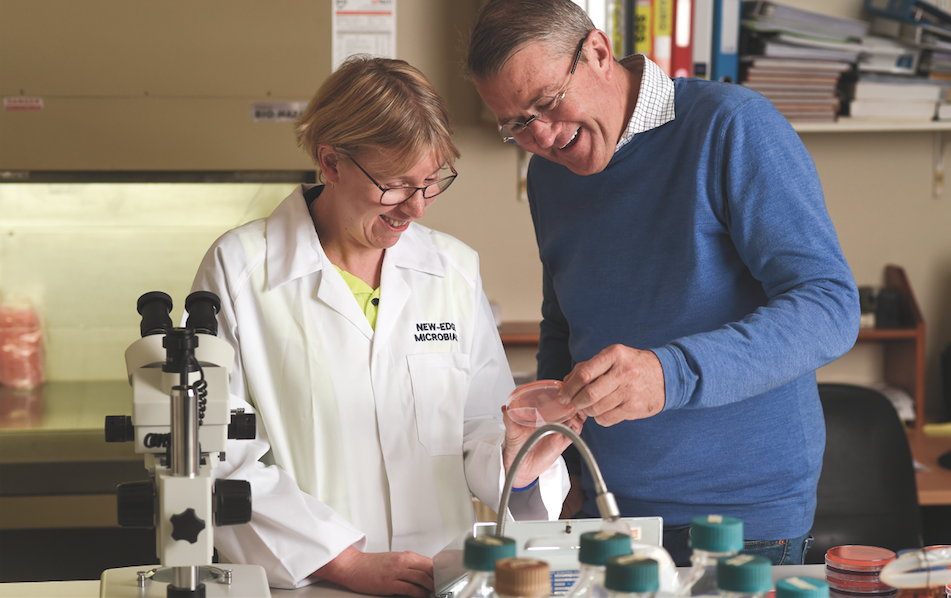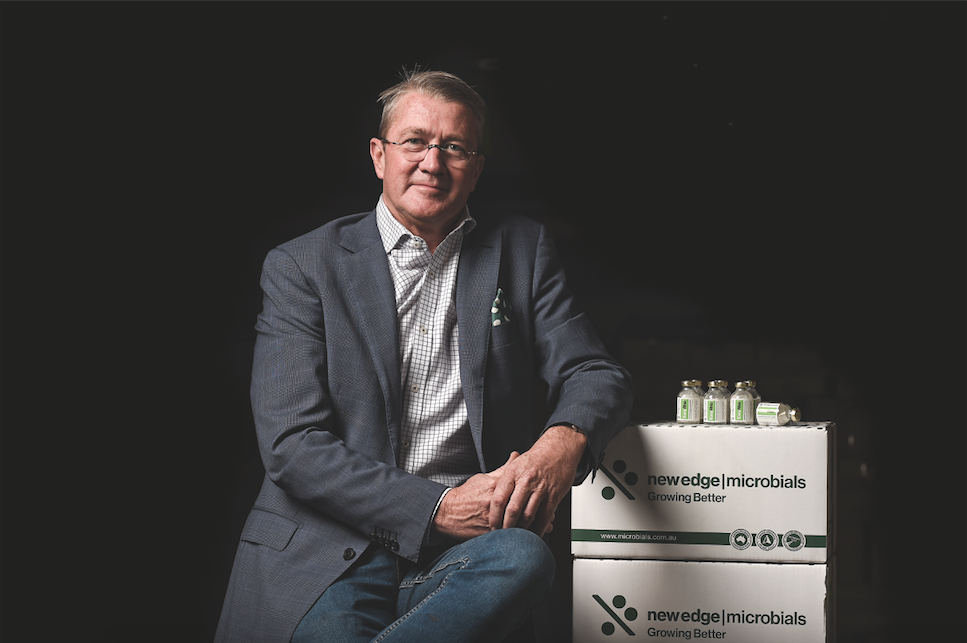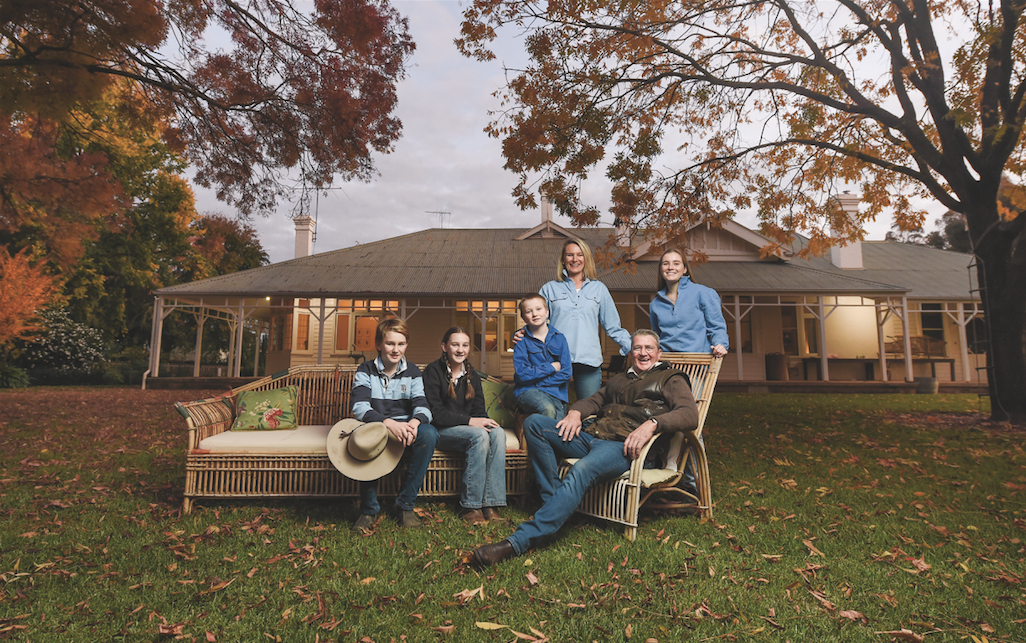The long game can be a tough one to play in business. Demands for short-term gain year in, year out, can be a drag on long-term prospects as stakeholders demand immediate returns. There are, however, some industries that can only be viewed as long-game prospects.

Agriculture is prisoner to its reliance on crop success, determined as much by climate as it is human endeavour. It can be a roller-coaster ride through famine and plenty, requiring a firm grasp of farming principles and technology, business acumen and a large dollop of patience.
But it’s a calling with lifelong appeal to Ben Barlow, Managing Director of New Edge Microbials (NEM). His love of farming combines naturally with his expertise in economics and business management to drive a company that sits at the cutting edge of biotechnology, and feeds his insatiable curiosity for the new.
“Agriculture I understand very well. I understand its cycles,” he reflects. “If you look at the investment community, the general feeling about agriculture is that it’s big, robust and risky. Those who actually understand it and have a long-term view have done well out of agriculture – over a long time. That’s what attracts me to it.”
Ben’s family has been farming for about 150 years. He broke from it for a time during the last recession by going to university for economics and commerce degrees, then worked as a bank teller at National Australia Bank (NAB) before embarking on an agribusiness banking career.
In 2009, NAB bought Great Western Bank in America, so Ben travelled there to work as its Vice President and build its agribusiness.
We’ve spent a lot of money researching the global biologicals market and what we see as the big addressable areas.
“When I returned, I decided to go farming. My wife and I had aggregated 32,375 hectares near Hay, and in 2015 we sold it to the Paraway Pastoral Company, which was part of Macquarie Bank. We decided to spread our investments between pure agriculture and pre- and post-farmgate businesses that we understood,” he recalls.
“I’ve had the luxury of being a farmer all my life, and I’ve been in commerce as well, and the two have come together. The notion that we could be a regional business at the forefront of global biological work, supporting communities that we’ve had a lot to do with during our lives, appeals to me.”
On a trip to Israel in 2015 to study irrigation technology, biotechnology, logistics and automation, Ben realised that traditional Australian farming systems were undermining the vitality of its soils and vegetation, and was detrimental in the long-term.
“I realised that we’ve been pushing our country very hard in cropping rotations for 25 years, and biotechnology would be complementary to chemistry, such as fertilisers. I set about looking for biological companies in agriculture in Australia and there were three – two very small ones and New Edge Microbials – so we bought the majority interest in New Edge about three years ago.”
The path to expansion
Based in Albury in New South Wales on the border with Victoria, NEM has been in business for about 20 years producing nitrogen fixing bacteria for application on legume seeds.
What Ben saw in the company was a “well built” family business that grew from the ground up under the sound foundations provided by the company’s founder and ever-curious microbiologist Sandy Montague. (Sandy is still a shareholder and provides lots of advice and support, Ben points out.)
NEM now holds about 65% of the Australian market in this space, has a wide net of about 600 distributors around the country and overseas, and boasts the largest fermentation capability in the country.
It operates in Australia with crops such as peas, beans, chickpeas and lentils – a two-million-hectare market in Australia – but the company’s focus is now moving to cereals and oil seeds, with crops totalling about 13 million hectares.
“That gives you a perspective of the opportunity to broaden our base from legume inoculants into cereals and all seed inoculants in the future,” Ben says.
“Research done independently by universities and departments of agriculture shows the results on the rhizosphere – the area around the roots of plants. These products set nitrogen around plants’ roots to help them grow and thrive.
Microbial inoculants help farmers
Microbial inoculants use beneficial rhizospheric or endophytic microbes to promote plant health. They can be applied to improve plant nutrition, as well as stimulate hormone production in plants to promote growth. Research has shown that inoculants in agriculture can be used as fertilisers, but they can also assist in developing resistance in some crop species to several common diseases.
It’s like building a barrier against harmful bacteria around the roots while also allowing them to make their own nitrogen. There’s a lot of independent scientific work done, probably 40–50 years, which demonstrates that it protects the plant, but also creates high yields.
“And as an example, we’ve been using inoculants on our legume crops for 20 years, because of the savings benefit. An inoculant outlay worth A$5 per hectare can be A$200–300 worth of free nitrogen and increased grain yields up to 1.5 tonnes per hectare. The community of agronomists and growers support us and have been using it for many years. So it’s not like a new science; it’s the core of our business that we’re good at, and using that core is why we want to go into other crops. New companies that operate the way we’ve operated the past 20 years are chasing those new frontiers too.”

Ben points out that Sandy very effectively built a business with a solid platform from which to take the company to another level, including exports to other markets. NEM exports to New Zealand, Europe, Africa, and North and South America.
“We’ve spent a lot of money researching the global biologicals market and what we see as the big addressable areas, looking at our technology and what we could patent. We’ve overlaid that with the sort of research we should be doing in a targeted way for the big issues in agriculture here and abroad. That’s our pathway – to look at applied science in the big areas we want to focus on,” Ben explains.
He considers his role as two strings on a bow. One is to grow the company as it is today, including opening export markets, and utilising technology and equipment to increase manufacturing efficiencies.
His focus is annual growth of 20% year on year in revenue and holding margins, which NEM has achieved, and reducing operating costs by 7% year on year through automation and managing its supply chain.
“They’re the hygienic things about building a bigger business and making more money. But running concurrently with a solid R&D focus on four very large addressable areas in agriculture,” he adds.
R&D – THE PRIZE One of those is the development of a coat for cereal and oil seeds that produces high-yielding crops in dry climates or in the face of climate change. The second is a seed coat and treatment that can be applied on seeds to draw carbon from the atmosphere and set it in the plants’ roots, effectively dealing with carbon emissions.
That, says Ben, will refocus agriculture from simply cropping to potentially making large contributions to carbon sequestration simultaneously. “There are two reasons for that,” he expands.
“One is to do the right thing by the environment, but the other is to allow farmers to trade carbon in their cropping rotations. When you do the mathematics on that, the value of carbon – if your products can cause enough carbon to be absorbed out of the atmosphere and stored in the soil in a cropping rotation – is probably of a similar value to the seed or grain you’re harvesting. Those two are multimillion-dollar streams, where we at NEM have both background IP and proprietary formulations, and the ability to take it globally.”

Ben’s third focus is scientifically proven bio-fertilisers. NEM is investigating the correct microbiological formulations in healthy, fertile soils that existed before they were disturbed, then researching and ultimately producing a granule, or readily distributed product, that could be incorporated with traditional synthetic fertilisers to improve their performance.
New Edge – New Cultures
New Edge Microbials also produces microbial cultures for the bioremediation of industrial, agriculture and aquaculture wastes. The company cooperates with other microbiological companies and universities around the world to develop a range of products that can treat waste materials in these industries. NEM develops microbe strains that are among nature’s most powerful – and useful – means of degrading waste, and can target specific undesirable compounds to break them down, accelerate contaminant removal processes, and improve biotreatment processes.
The annual fertiliser market in Australia is worth about A$5 billion, but NEM has no interest in being a fertiliser manufacturer. “We’re a very good microbial producer that fertiliser companies might contemplate using. We’re not into the fertiliser business – it’s a high-volume, low-margin and very competitive business,” he concedes.
The fourth area of R&D interest for NEM is crop protection, developing foliar treatments to shield crops against pests and climate extremes. These four streams in R&D coalesce into a comprehensive course of environmental protection and enhancement.
Agriculture’s future
The consequences of this could be quite profound for the world’s food production, says Ben, as well as its longer-term impact on the planet. “If you look at large impacts on the globe, you’ve got common thematics.
We’ve got a growing population, declining soil health from years of continuous farming, and we’ve got consumers saying they want fewer chemicals in products or they want to see farmers operating efficiently without chemistry or fertilisers coming from finite resources.
“I’ve always held the view – a lot of people laughed at me a long time ago about this – but I said there was an industrial revolution and there was a financial revolution. Now I think those who do well this century will be the ones that manage our finite natural resources best.”
Ben adds that there is a fundamental burden on Australian producers to lift their game or they will struggle to meet the expectations of global markets for ‘cleaner’ food products in the future.
“We’re early in the game in Australia, and as a farmer I look at the rest of the world thinking that if we don’t start looking at these things like they are, I wonder what the world’s consumers might say to us here in 10 years’ time if we’ve got higher chemical residues than other markets because they use a mix of biologicals and chemicals.
“The EU has passed legislation to reduce chemical application in agriculture by 25% by 2030. It also wants the application of synthetic fertiliser or nitrogen reduced by 25% by 2030, and 25% of European production has to be organic by 2030. They’re huge changes. What that means is the traditional chemical application in agriculture has to find ways to work with microbiology in the soils or within the plant to try to hit that target. So all of a sudden we have an interest from large agriculture chemical companies looking at this space.”
Your reputation comes on the back of a turtle out here and it leaves on the back of a galloping horse. We’re building a company with a long-term future.
That is a spur for NEM to pursue its already heavy investment in its own sphere of biotechnology. It is another facet of agribusiness that can only look to the long-term, according to Ben.
“We would spend 20% of revenue on R&D right now. It’s part of our family’s portfolio of interests, so the core intent of the company is to reinvest everything into research and development and automation and to take it to another level. It’s not as if we have to distribute a dividend at the moment to shareholders. We think there’s a benefit in creating a lot of value here and we’ll do it for the long run.”
Ben has been very deliberate about where he sees NEM heading, following three years of formulating its core strategic intent and the R&D to match it.
“You run the risk of running up and down lots of dry gullies, but you need to do your research where you want to focus and then, within those tram tracks, explore everything you need to, but stay focused on the main game and your core strength and strategy. It is interesting, given that we’re a little company in the bush that has got the dominant market share in Australia against some of the big multinationals,” he insists.
Country business relationships
There are numerous companies in regional areas operating in a global space, and they run using a different philosophy than what might be considered a textbook method of management. NEM is heavily reliant on partnerships built over 20 years to maintain its market dominance.
Many of those are sealed simply with a handshake. According to Ben, trust is an integral part of such relationships built over time. “We tend to operate that way and we expect that in return. In the bush, your reputation comes on the back of a turtle out here and it leaves on the back of a galloping horse,” he quips.
“We’re building a company with a long-term future, with a long-term thought process around it, not an annualearnings-announcement style. It changes the way we think about doing business with people, and it changes the way we think about these relationships.
“We hold no contracts with any of our suppliers. A lot of them have been contractors supplying the company for 20 years and, over that time, we have reached an understanding of what fairness is for them and they have an understanding of what it is in return, and thus the relationships are very strong.”
The company’s intellectual capital is its strength as it races to develop microbial products that can reach around the world. Its R&D budget places downward pressure on demand for dividends, seeking that future bonanza when NEM can meet global expectations for agricultural breakthrough technologies.
Your key people are actually the people at the front, engaging with customers and growing the business. Your job is to get the best out of them as a leader – to set the standards and live the principles.
“Agility is one of the core strengths of NEM. We’ve been very deliberate about having people on our share register who bring knowledge rather than dollars. We have a profitable business and a reasonable amount of capital behind us, but we have invited shareholders in because of what they bring in their knowledge of the market or their ability to guide us on our future direction. We have a philosophy that brains are more important than dollars,” Ben says.
Lead from behind
With many years to observe leadership styles, Ben has taken the view that directors should lead from behind instead of leading from the front. He considers that while a leader might set the tone and culture of the company, if they can draw out the best ideas from bright people and foster them, they will love what they’re doing and make massive contributions.
He looks back on his tenure in a hierarchical banking culture, with a traditional pyramid of leadership, and sees a better alternative. “If you tip it upside down, your key people are actually the people at the front, engaging with customers and growing the business. Your job is to get the best out of them as a leader – to set the standards and live the principles,” he suggests.

“In my 20s, I was selected to go on a program for emerging leaders in agriculture. I was there with some really smart leaders and I learned a lot. Nowadays I’m inclined to say, ‘Whatever happens, happens. I just have to deal with it at the time.’
What it really taught me to do was have the confidence early in life to say, ‘I don’t know where this is going, but I’ll deal with it as it goes.’ A lot of leaders today try to manage things within a certain scope, and perhaps sometimes they restrict their ability because they are not letting themselves be challenged by something that’s unfamiliar.”
Ben makes a habit of going for long walks with key people in the company and talking through issues, rather than meeting at a desk. “There’s something cathartic about walking and talking, and being creative as you walk,” he points out.
He learned that from his grandfather, who had a profound influence on him. A farmer all his life, Ben’s grandfather had a broad awareness of the vicissitudes of life and a firm grip on the reality of dealing with challenges as they appear.
“My grandfather used to have a saying, ‘If you think you’re stuffed, you are.’ Basically, he was saying that if you talk yourself out of it before you start, you’ll never achieve it,” Ben recalls.
“You think about all the choices you have in a day and you look at what you’ve got to do. Now, if you talk yourself out of something that could be profound, you’ll never go there and you’ll never ever achieve it. I think that’s what he was trying to say in his own bush way.”
With two children away at boarding school and two young children still at home, his focus is very much on their education and living a balanced life in his local community. He winds down very simply, he says, when he’s out of the office.
“We spend a lot of time as a family in this community; it’s a small community here in Corowa where we live. There are only about 3,500 people in town, so we all know one another pretty well. But our wind-down time is pretty simple. It could be on the Murray River waterskiing or fishing, or just going down to the paddock and lighting some sticks and having a barbecue. We just enjoy living in this open-spaced, very understated lifestyle.” Sounds like space for growth, professionally and personally.


